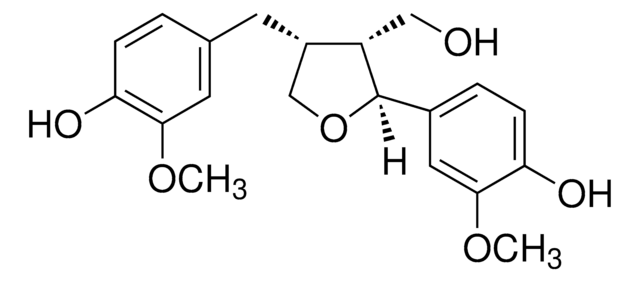223735
Coniferyl alcohol
98%
Synonym(s):
3-(4-Hydroxy-3-methoxyphenyl)-2-propen-1-ol, 4-Hydroxy-3-methoxycinnamyl alcohol
About This Item
Recommended Products
Quality Level
Assay
98%
form
solid
bp
163-165 °C/3 mmHg (lit.)
mp
75-80 °C (lit.)
solubility
alcohol: moderately soluble(lit.)
diethyl ether: freely soluble(lit.)
water: insoluble (almost)
functional group
hydroxyl
storage temp.
−20°C
SMILES string
COc1cc(\C=C\CO)ccc1O
InChI
1S/C10H12O3/c1-13-10-7-8(3-2-6-11)4-5-9(10)12/h2-5,7,11-12H,6H2,1H3/b3-2+
InChI key
JMFRWRFFLBVWSI-NSCUHMNNSA-N
Looking for similar products? Visit Product Comparison Guide
Related Categories
General description
Application
Storage Class Code
11 - Combustible Solids
WGK
WGK 3
Personal Protective Equipment
Choose from one of the most recent versions:
Already Own This Product?
Find documentation for the products that you have recently purchased in the Document Library.
Customers Also Viewed
Our team of scientists has experience in all areas of research including Life Science, Material Science, Chemical Synthesis, Chromatography, Analytical and many others.
Contact Technical Service













